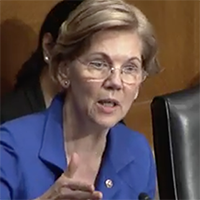Warren to CMS: Medical device identifier requirements should be a 'no-brainer'

Sen. Elizabeth Warren, D-Massachusetts, took the Centers for Medicare and Medicaid Service to task on Tuesday for waffling on the policy to add unique device identifier information to Medicare claims forms.
“Patients going under the knife need to have confidence that they’re getting a product that isn’t likely to fail or get recalled and force them to have to have a second operation,” said Warren, as part of her final questions during the Senate HELP committee yesterday.
“But right now, doctors don’t have the information available to tell which pacemaker has a failure rate of, say, one-tenth of 1 percent -- and which one has a failure rate that is 10-times -- or even 100 times higher,” she said.
[Also: ONC won't define info blocking, can't support EHR reporting program]
In 2007, Congress began to require that medical device manufacturers label all medical devices with a UDI -- a string of numbers and characters to specify the vendor and model of each.
“But, of course, those data are valuable only if we actually collect them,” said Warren.
"It is time for CMS to step up to protect payments and to protect the Medicare system."
Sen. Elizabeth Warren
Warren asked CMS Director of the Center for Clinical Standards and Quality, and Chief Medical Officer Kate Goodrich, MD to “clear this up” and explain whether the agency supports adding UDI information.
“Patient safety as it relates to devices is obviously very important to CMS,” said Goodrich. “However, at this time, I don’t have anything else to offer besides that. Because -- as is customary for new administrations -- we are still reviewing this policy.”
[Also: Identity management the new 'perimeter' for hospital cybersecurity]
“Alright, let me just say: This should be a no-brainer,” Warren responded. “Your agency’s own watchdog says you should do it, MEDPAC says you should do it, organizations that represent orthopedic surgeons, cardiac surgeons, thoracic surgeons, all say you should do this.”
“And I’ll be blunt: We’re going to keep pushing on this,” she added. “It is time for CMS to step up to protect payments and to protect the Medicare system.”
Warren has been a staunch supporter of this policy for years.
CMS showed signs of supporting the addition of UDI to Medicaid claims forms in 2016.
However, it continues to send mixed messages about whether the agency will add this necessary information to the claim form.
In a report released last month, OIG recommended CMS add at least partial adoption of UDI in the next version of Medicare claims forms. CMS said it was reviewing the policy, and its Administrator Seema Verma suggested that the addition may not happen.
A few days later, CMS put out another statement that said UDIs on the claim forms would “reduce Medicare costs by identifying poorly performing devices more quickly, while protecting patients from unnecessary costs.”
But again, a few more days passed, and CMS put out another statement that said the policy was still under review and the earlier statement was wrong, Warren said.
Department of Health and Human Services Office Inspector General Senior Counsel James Cannatti told Warren that in a recent report OIG found that over a 10-year period, about $1.5 billion was paid for Medicare services related to the replacement of devices that failed prematurely.
That equated to about $140 million in beneficiary copay and deductible liability. And that’s just on seven cardiac devices.
Twitter: @JessieFDavis
Email the writer: jessica.davis@himssmedia.com

























